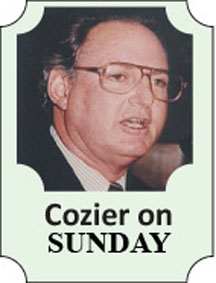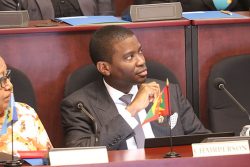Dennis Waight is a name repeatedly cited by the players as critical to the development of the great West Indies team of the 1980s as they themselves.
His influence was once more raised by Joel Garner in an interview on SportsMax, the television channel out of Jamaica, last week.
“Big Bird” Garner, the giant lethal fast bowler, was one of those who benefitted from Waight’s strict training regimen that enhanced the immense natural talent within Clive Lloyd’s teams of the 1980s with a physical fitness, stamina and sharpness rarely previously seen.
 The purpose of Garner’s presence at Sportsmax was to field questions from hosts Simon Crosskill and Lance Whittaker on his manifesto as a candidate for next week’s election for the West Indies Cricket Board (WICB) presidency.
The purpose of Garner’s presence at Sportsmax was to field questions from hosts Simon Crosskill and Lance Whittaker on his manifesto as a candidate for next week’s election for the West Indies Cricket Board (WICB) presidency.
Entitled “Restoring Pride to West Indies cricket”, it held that the WICB, of which he is a director as Barbados Cricket Association (BCA) president, had focused on “many other things” at the expense of its “main business which is cricket.”
It contains several convincing points; his reference to Waight related to current affairs, namely the West Indies performance in the World Cup.
Judged by the images visible to on the television coverage, Garner is clearly upset by the team’s overall lack of fitness and resulting lethargy. With a few exceptions, key players are carrying extra weight in the wrong places. The effect is the same as it is on the back of race horses.
Compared to the other, indisputably fitter major teams, the fielding is pedestrian; catches that should be taken at the highest level have been shelled. The casual running between the wickets usually represents a deficit of 20 runs an innings, even more.
On Friday, AB de Villiers and partners scampered between wickets like so many Usain Bolts, taking advantage of their opponents’ lack of urgency in the field, gathering tight singles, turning ones into twos and twos into threes as the total mounted to over 400.
He and Rilee Roussow didn’t allow a solitary dot ball during the five-overs batting power play that yielded 72; all told there were 107 scoreless deliveries in the 50 overs.
There are no such exertions for West Indies batsmen who seemingly approach this aspect of the game as they might a Sunday afternoon stroll along the boardwalk. They soaked up 166 dot balls to Ireland’s 126 in their opening match loss; the count in the record partnership of 372 between Chris Gayle and Marlon Samuels against Zimbabwe was 140.
It is an unnecessary state of affairs at a time when the support staff is manned by an acting head coach, an assistant coach, a bowling coach, a fitness trainer, a massage therapist and a video and statistics analysis, all under the manager.
The standards of fitness and fielding of the glory days inspired a corresponding improvement through the territories. Panthers like Faoud Bacchus, Sheldon Gomes, Emmerson Trotman and Shane Julien were typical of those in the Shell Shield at the time.
It has since appeared to be the reverse. There are several areas in our cricket that need urgent attention; this is high on the list.
But who was Dennis Waight?
He was not West Indian but Australian. His sporting background was not cricket, instead the tough sport of rugby league. Kerry Packer plucked him from his job as trainer/physio at one of the Sydney league clubs and told him to take charge of the West Indies team he had signed up as part of his World Series Cricket in 1977.
As Waight tells it, his first impressions were of a group of naturally gifted sportsmen short of the fitness required in all professional sport. His strict methods, imported from rugby league, entailed distance running and punishing exercise, rather than gym work.
“Cricket is a game played on grass. You run on grass. You don’t run in the gym,” was his reasoning. He would set the players a daily regimen of 500 push-ups, press them to jog miles uphill.
There were, inevitably, initial complaints until captain Clive Lloyd and his men quickly appreciated the resulting upgrading of their stamina, the decrease in muscular injuries and their sharpness in the field.
Waight became not only a valued member of the support staff but, for all, a genuine friend. There was nothing he asked his charges to do that he didn’t do himself; most mornings he could be seen pacing through the streets of a cricket capital somewhere in the world even before his players were up. His typical Aussie taste for a cold beer, or a dozen, was not a hindrance; he considered it an advantage.
He was in the role for 23 years. The end was signaled on the 1999-2000 tour of South Africa. Those who had come up under him had retired and their successors deemed his methods too demanding.
I realized the problem when I returned to the team’s hotel in East London one morning and found Waight in the bar when, at that time, he was usually out conducting his training sessions. The manager, ironically Clive Lloyd, told him captain Brian Lara and vice-captain Carl Hooper had approached him to ask that Waight ease up on his workouts; Waight duly obliged.
“It just means I can have a couple of beers in the morning now,” he told me.
These are different times, of course, but the need for a Waight equivalent in the West Indies setup, with the full support of the WICB and the territorial boards, is urgent and essential to “restoring the pride to West Indies cricket.





